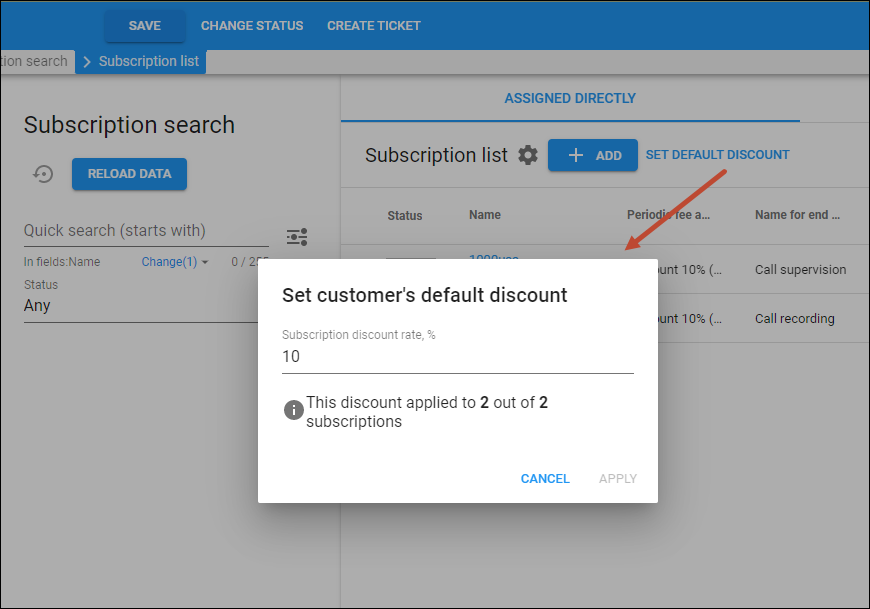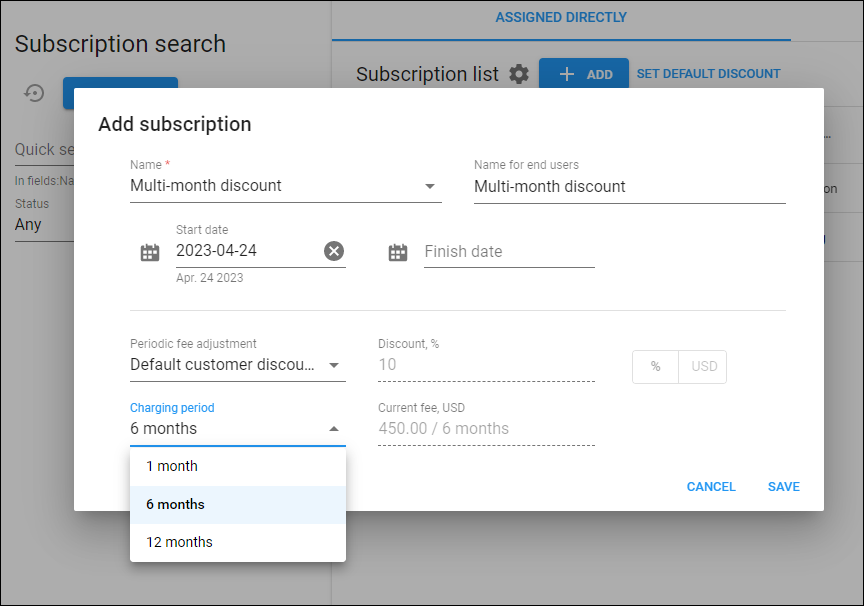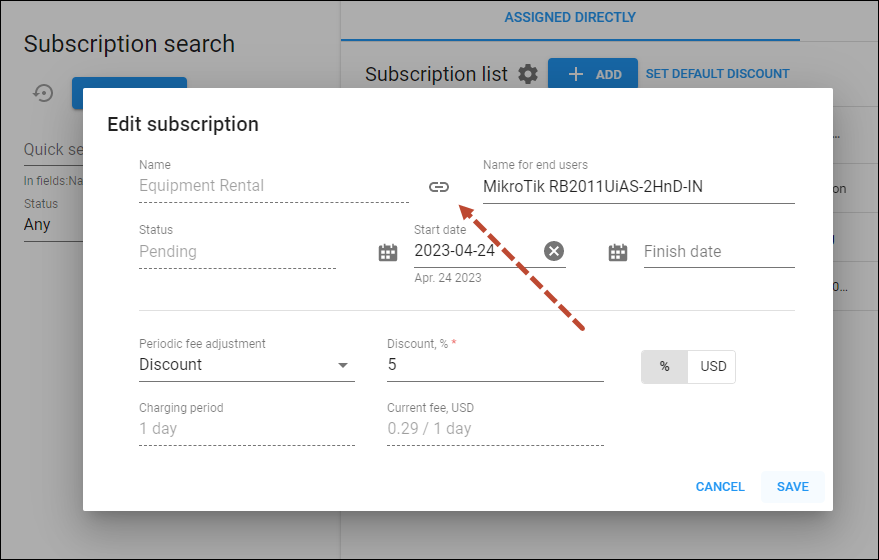On this tab, you can see the list of subscriptions assigned to this reseller directly that match your search query. You can manage these subscriptions, assign more subscriptions to the reseller, and set the default discount.
Each subscription record has the following columns:
Status
The status of the assigned subscription:
- Pending – subscriptions that are not yet active and will be activated in the future.
- Active – currently active subscriptions (the reseller is billed for these subscriptions).
- Closed – subscriptions that have already been closed.
Name
The subscription name which is also the link that leads you to the Edit subscription dialog. Under the name, you can see the standard subscription fee per reseller’s billing period.
Name for end users
The subscription name that resellers will see on their portals.
Current fee
The amount of money that is charged for the current billing period.
Next fee
The amount of money that will be charged for the next billing period.
Periodic fee adjustment
This shows whether you increase or reduce a recurring fee for this reseller.
- No adjustment – the standard subscription fee is applied. Even if the default discount is set for the reseller, this discount will not apply to this specific subscription.
- Default customer discount – the default discount that is set for the reseller will be applied to the subscription, e.g., “Discount 10% (default)”. With this option, even if the default discount is not currently set, it will be applied to this subscription once set for the reseller in the future.
- Discount – a fixed discount amount or a discount rate is applied to this specific subscription, e.g., “Discount 15%”.
- Upcharge – a fixed amount or an upcharge rate is applied to this specific subscription to increase the subscription fee, e.g., “Upcharge 8 USD”.
Activation date
This shows the date when the subscription is activated. Note that if an activation fee is defined for a subscription, it’s applied on the activation date.
Billed to
The end date of the billing period to which the subscription applies.
Promotion ends
The end date of the promotional period. This period is set in the subscription settings. To add/remove this column, click Settings ![]() on the title bar, click Customize columns, and select/clear the Promotion ends checkbox.
on the title bar, click Customize columns, and select/clear the Promotion ends checkbox.
Start date
The date when the subscription is activated. This date is set when assigning the subscription to the reseller.
Finish date
The closing date of the subscription.
How to set a default discount for all subscriptions assigned directly to the reseller
You can reduce the subscription periodic fees for a specific reseller by providing them a discount that by default will apply to all subscriptions assigned to the reseller directly. You can manually change/remove this default discount for a specific subscription when you assign a new subscription to the reseller (or by editing an already assigned subscription).
Note that the 100% discount rate means “free service”.
To set a default discount for the reseller:
- Click Set default discount on the toolbar.
- In the Set customer’s default discount dialog, specify the default discount rate for the reseller’s subscriptions, e.g., 10.
When you change the default discount for the reseller, e.g., from 10 to 15%, the new rate will automatically apply to all subscriptions with the Default customer discount option selected in the Periodic fee adjustment field.
- Click Apply.

How to add a subscription
To assign another subscription directly to the reseller:
- Click Add on the toolbar.
- Fill in the information in the Add subscription dialog:
- Name – select the subscription from the dropdown list.
- Name visible to end users – type a clear subscription name that resellers will see on their self-care web interface.
- Start date – choose a desired subscription activation date (by default, the current date is set). Click Calendar
 and set the date, or type it in the “yyyy-mm-dd” format (2022-09-07).
and set the date, or type it in the “yyyy-mm-dd” format (2022-09-07). - Finish date – choose a subscription closing date (the finish date is not set by default). Click Calendar
 and set the date, or type it in the “yyyy-mm-dd” format (2022-09-10).
and set the date, or type it in the “yyyy-mm-dd” format (2022-09-10).

- Periodic fee adjustment – you can choose whether to apply the “default customer discount” (if it’s set for the reseller), a specific discount/upcharge, or to not adjust the periodic fee at all. The default option is Default customer discount. You can choose one of the following options:
- No adjustment – the standard subscription fee will be applied (even if the default customer discount is set for the reseller).
- Default customer discount – a discount defined in the Set default discount dialog will be applied to the subscription fee, e.g., 10%.
- Discount – select this option if you want to set a specific discount for this subscription. Specify the fixed discount amount or discount rate in the corresponding field, e.g., “Discount 15%”. A 100% discount means “free service”.
- Upcharge – select this option if you want to apply an upcharge that increases the standard subscription fee. Specify a fixed amount or an upcharge rate in the corresponding field, e.g., “Upcharge 8 USD”.
- Charging period – select the charging period if the multi-month prepaid plan is configured for the subscription charged in advance, e.g., 5 months.

- Current fee – this is a read-only field that shows the subscription periodic fee that is charged each billing period.
- Click Save.
How to remove a subscription
You can remove only subscriptions that haven’t been activated yet (that have been assigned but are pending activation).
Click Delete ![]() next to the subscription in the list and click Delete in the confirmation dialog.
next to the subscription in the list and click Delete in the confirmation dialog.
How to review and edit subscription details
You can edit only pending and active subscriptions. To edit a subscription, select a specific subscription from the list and click its name.
The Edit subscription dialog opens with the details of the subscription. You can change:
- The subscription plan name that is visible to end users (Name for end users field).
- Set the subscription closing date (Finish date field) to cancel the subscription.
- The Periodic fee adjustment option.
- The charging period for the subscription that is charged in advance with configured multi-month prepaid plans.
To open the corresponding subscription page to see the details, click Show ![]() .
.
Customize the panel
- Change table settings – click Settings
 in the title bar to customize columns and change row style.
in the title bar to customize columns and change row style. - Re-order the columns – drag-and-drop the column headers right or left to place the columns in the order you want.
- Re-order the rows – click the arrow
(or
) next to the column header to re-sort the rows. For example, the Subscription list displays records in alphabetical order. You can re-sort them in the reverse order.
- Change the default number of results globally – use the Number of results dropdown list in the upper right corner to adjust the maximum number of rows that appear on the panel. By default, the panel displays 25 rows. Once the number is changed, it’s automatically saved, so the same number of rows is shown for PortaBilling entities, e.g., customer, account, reseller, etc.





